Gold Coast jockey Ryan Plumb’s spiral into drugs, theft and homelessness
Leading jockeys have declared radical plans need to be introduced to stop athletes ‘running the drugs gauntlet’ as the sport fights to stop more lives being lost. SPECIAL REPORT
Racing
Don't miss out on the headlines from Racing. Followed categories will be added to My News.
LEADING jockeys want a total overhaul of Queensland racing’s drug-testing system as the number of hoops testing positive to banned substances spikes.
Queensland Racing Integrity Commission (QRIC) data shows 10 jockeys failed drug tests in 2021, up from five in 2017 and 2018.
Top riders felt the industry needed to be more stringent on jockeys “running the gauntlet”.
Retired jockey and “King of the Coast” Dan Griffin said he was tested only about five times in the final 10 years of his career; Chris Whiteley about eight times over 30 years; and Michael Cahill said he had provided samples “a few more times” than the others.
All three said not enough testing was being conducted, particularly on race days. Cahill added the QRIC should adopt the methods of international racing bodies.
“I have ridden in several countries and some seem to make it more of a priority,” Cahill said.
“In Hong Kong they would test four jockeys at every meeting. They were randomly picked and you had to provide both a breath test and urine sample.
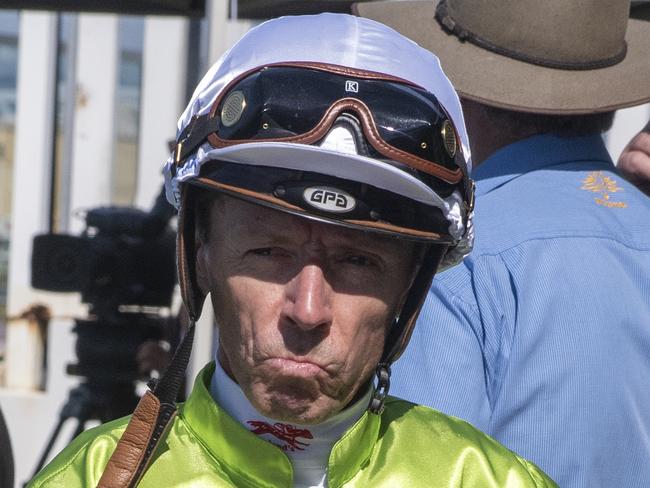
“The breath test was up to an hour to the first race and the urine sample was anytime during the meeting.
“In Singapore, it was two jockeys per meeting. From my experience, I don’t think they tested you at the track in the morning through the week, where as in Queensland I have gone three years and haven’t been tested and then tested twice in a month.
“I think it would be a good idea (to use the methods of Hong Kong and Singapore).”
Griffin said he expected to be tested more given he worked in Brisbane and on the Gold and Sunshine coasts and was worried it gave “jockeys a chance to run the gauntlet”.
He said he had been told jockeys were hiding at the track to avoid testing officials and others did not turn up on days random testing was done.
Griffin was a close friend of the late Arron Kennedy, a two-time Gold Coast premiership winner who killed himself in 2007after dabbling in drugs. Queensland champion Stathi Katsidis died after a drug binge before the 2010 Cox Plate.
“Riders have lost their lives. Not just in our industry, in football and everywhere else. There should be a better approach to it,” Griffin says.
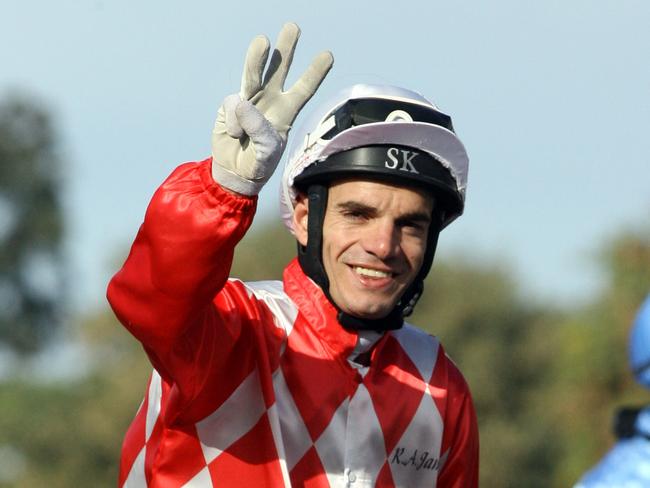
He hit out at riders who compromised both their own lives and that of their colleagues.
“I had a family so I wanted to get home to them,” Griffin said.
“If they are going to be under the influence they shouldn’t be out there. They should have more care.
“I know of occasions where it has happened on-course and I think it is disgraceful.”
In the 2020-21 racing thoroughbred racing season, QRIC collected 594 samples, 323 of which were breath tests and 271 were urine. Stewards took 129 human samples.
“Human sampling is both random and targeted,” a statement from QRIC read. “Individuals can be selected for sampling based on intel-based information.
“Jockeys can be tested at any time and place. The commission reserves the right to test when and where it decides, and does not divulge its methods, costs or future testing plans.”
Griffin criticised QRIC’s decision to stop putting the type of prohibited substance used by offending riders on public record, as it made those jockeys feel bullet proof.
QRIC officials said the racing body would “welcome discussion from industry on their views on any policy, including the decision to not name the drug detected.”
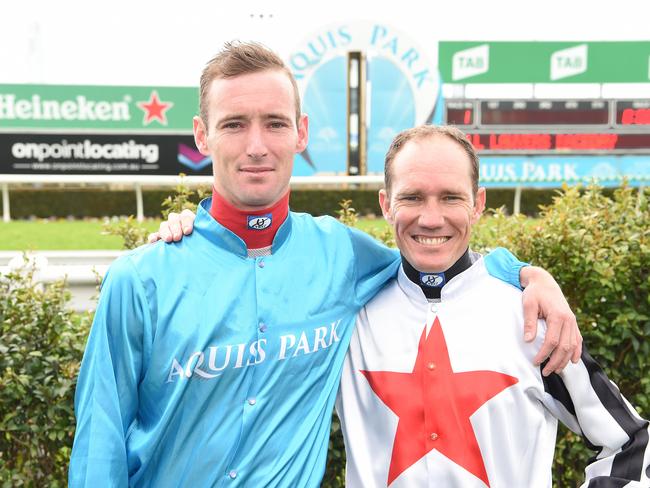
Whiteley suggested increased focus on teaching apprentices about the effects of drugs.
Racing Queensland CEO Brendan Parnell said regular education sessions were in place for jockeys while the sport’s state governing body was constantly working with other associations to find improvements.
“The impact of illicit substances is a societal issue and one that we’re all confronting,” Parnell said.
“As part of our apprentice school, drug education forms part of the mandatory curriculum, with jockeys required to complete units that focus on drugs and alcohol including their effects; skills and values; and stress and goal setting.
“Additionally, our apprentices receive annual education sessions from the Queensland Racing Integrity Commission - and Queensland Police - on drugs and alcohol.
“These sessions are filmed to ensure they are available throughout the year for those who may require further assistance.
“As recently as December, the apprentice school hosted a presentation on addiction for the benefit of our jockeys, with further topics to be delivered throughout 2022.
“While further resources are available to jockeys, not just apprentices, such as free access to confidential counselling services, we are committed to working with the Queensland Jockeys’ Association on how we support their members both on and off the track.”
The Queensland Jockeys Association said it is exploring ways to provide jockeys with greater access to rehabilitation.
“We are working on a program that could get jockeys into rehabilitation, but I don’t care what anyone says, it is something they have to want to do themselves,” interim boss Pam O’Neill said.
“We can lead them to water but you can’t make them drink.
“They are not being thrown to the wolves but we can’t do it for everyone, otherwise we would go bust.
“We get one per cent of prize money each season and that has to cover everything we do.”
‘He’s fighting demons’: Racing community reacts to jockey’s spiral
A short, skinny bloke is desperately seeking sanctuary on a park bench under a tree.
It is the middle of the night and pouring with rain. A nearby street light is his only friend.
The man is gaunt and malnourished and his eyes bloodshot, sunken with a look of fatigue from days without sleep.
At 33, he is homeless, having eloped with the wickedest witch on the Gold Coast – methamphetamines (ice) – turning his back on family and friends, who still refuse to leave his shadow.
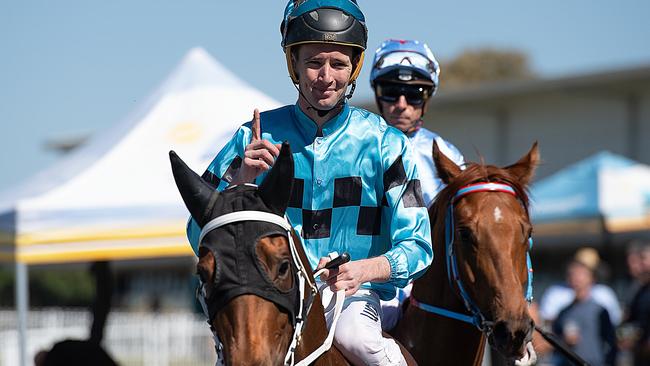
Two years earlier, that haggard man cowering from the summer rain was one of the city’s best athletes.
Ryan Plumb was the toast of Gold Coast racing, having ridden almost 360 winners for $5m in prize money.
The premiership-winning jockey would light up a mounting yard with his smile and happy-go-lucky nature. Each Saturday at the Gold Coast Turf Club, Plumb was in his element, exuding confidence and greeting everyone he came across as if he was seeing one of his closest friends for the first time in years.
However, his life began to spiral out of control about two years ago when he started disappearing for weeks on end. His relationship with his partner broke down, Plumb stopped riding, couldn’t pay his rent and his personal belongings were stowed in a storage shed.
Within weeks those items would be sold off and the shed empty, save for drug utensils.
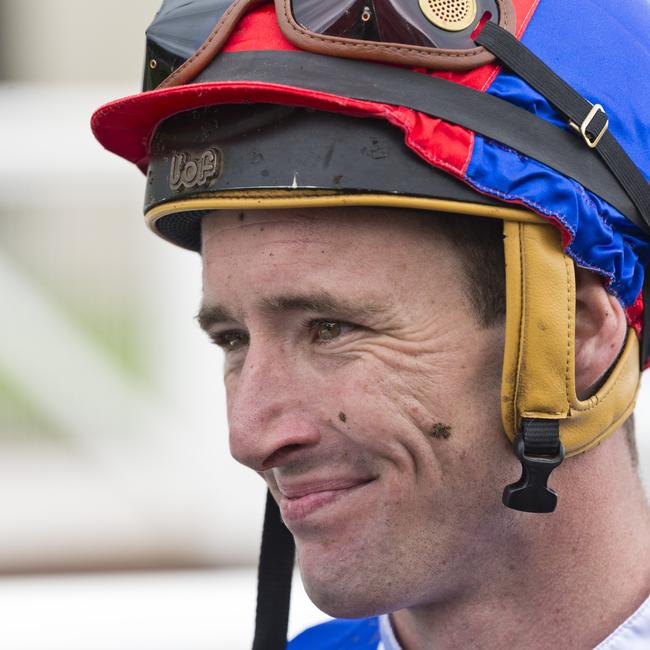
He spent time living out of his car but when its registration expired, Plumb was caught under the influence behind the wheel and the vehicle was impounded.
No money, no home and no car. His children were taken in by Plumb’s parents. His father Lyle had to return to full-time work in order to care for them.
For the past three months Plumb found a new home. He was on remand awaiting the fate of dozens of charges relating to drug possession, drug driving, driving without a licence, trespassing and entering a premises to commit an indictable offence.
In the Southport Magistrates Court on Friday, Plumb pleaded guilty to 31 charges.
In handing down a two-year probation order, Magistrate Louisa Pink said the jockey’s earliest charges late last year were minor, but his crimes escalated in seriousness through a “devastating descent into drug use”.
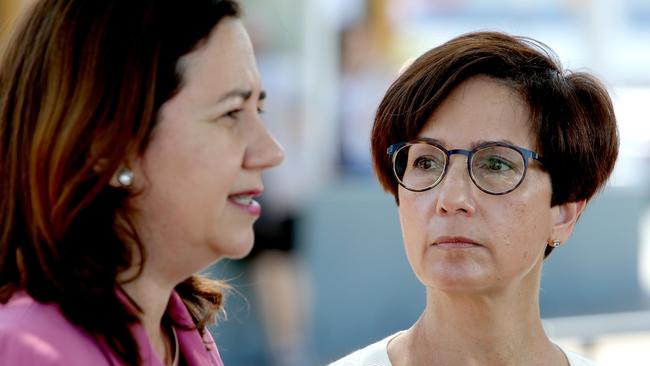
Plumb was ordered to take part in counselling and “attend other programs as directed”, notify correctional services every time he changes his residential address or location of work, remain in Queensland unless permitted otherwise, undergo urine testing and participate in therapeutic intervention to address illicit drug use.
His break-and-enter offences include trespassing at the turf club at Bundall and nearby stable facilities, the homes of family members and strangers, often consuming their food and sleeping in their beds, and placing kitchen knives in accessible points in case he was caught.
At other times he tried to hock stolen valuables, sometimes to fellow jockeys who have rejected his advances.
Despite the hoop’s descent, loved ones and the racing industry have stayed loyal.
Bids to get Plumb into rehabilitation have been unsuccessful, as have large offers from family, trainers, jockeys and other members of the racing community. Some have even put him up in hotel rooms to get him off the street.
Interim Queensland Jockeys’ Association boss Pam O’Neill says Plumb has received financial help and offers to see a sports psychiatrist.
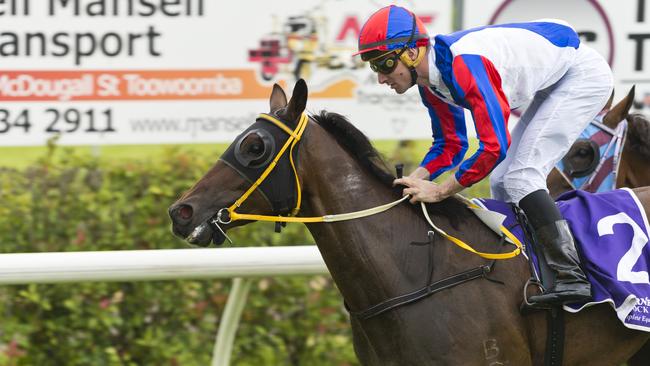
When asked about Ryan’s issues, Lyle Plumb said: “Ryan obviously has some issues and we hope that he can overcome these with professional help, and a support network that also includes sectors of the racing industry,” he said.
“Horse racing people have always been known to be forgiving to people who make genuine efforts to come back from rough times, and we can only hope this will be possible in the future.
“He is not the first jockey to make mistakes in his personal life, and will not be the last.
“The Gold Coast Turf Club has been very good to our family for a long time, and we appreciate their efforts in providing assistance to us.”
Fellow Gold Coast jockeys Michael Cahill, Chris Whiteley and former “King of the Coast” Dan Griffin all have known Plumb at his best and expressed sadness about his free fall.
“I have always got on really well with Plumby,” Whiteley said.
“I travelled with him to North Queensland a fair bit when he was an apprentice when he was starting off. He has obviously got mixed in with some of the wrong people and fallen down that path.”
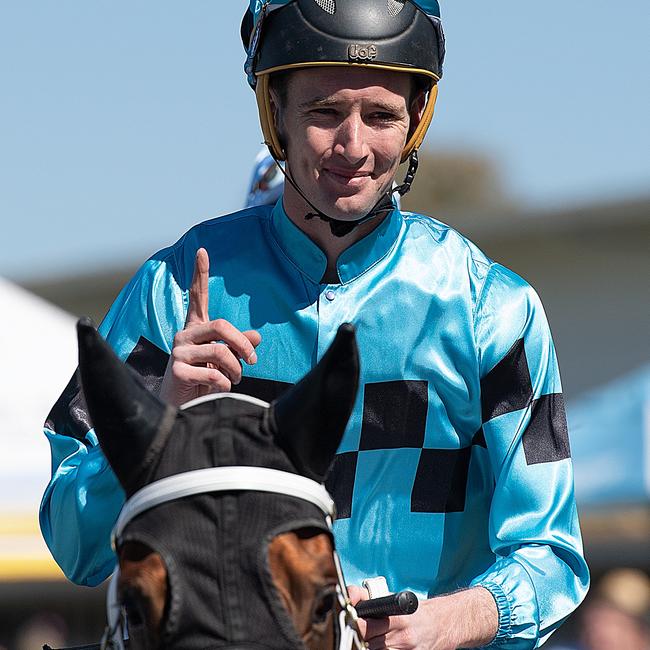
Cahill says Plumb has the ability to make a successful comeback.
“He is a rider with plenty of ability and just seems to be in a bad place,” he says.
“There are others like him. I have ridden against him since he was a little kid. It is a great shame.”
Griffin says it highlighted the demons Plumb is facing.
“He is a likeable bloke and always seemed so happy. He is just fighting some demons.”
Plumb has made attempts to get back into racing. He got a job riding track work for trainer John Moore in October last year but tested positive to a prohibited substance days later when the Queensland Racing and Integrity Commission conducted a urine test. He was stood down from October 12 and given a four-month suspension on November 11.
In early 2015 he was listed by police as a missing person after leaving his then-Melbourne home to buy cigarettes amid the breakdown of his marriage.
“I spent a lot of time contemplating whether I was leading the life I wanted to lead,” Plumb said in 2016 in a News Corp interview.
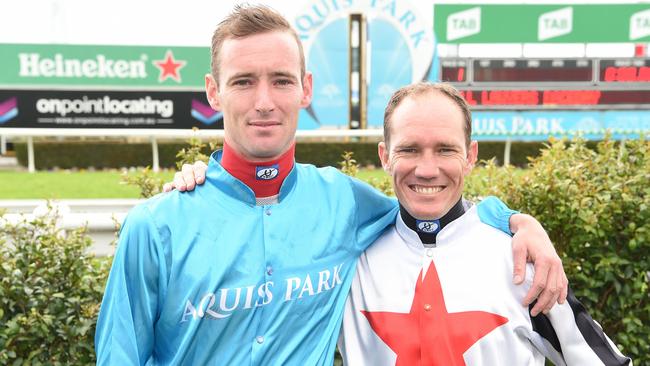
“I stayed at a friend’s house one night, slept in my car one night and after the third day I came back.
“I was deciding whether to end the marriage or not.”
His ordeal in 2015 had derailed a riding career that began with an apprenticeship in Brisbane and Adelaide before stints in Singapore, where he placed in multiple Group races, Dubai, China and Melbourne.
Plumb spent 14 months out of the sport but renewed his racing career upon his return to the Gold Coast in 2016.
Speaking via videolink in the Southport Magistrates Court last week, Plumb said he wasn’t proud of anything he had done.
“Breaking into someone’s house is a horrible thing. That is not me. I’d love to say I’m very sorry to them.”
Court: Most graphic illustration of a total descent into drug use
In sentencing Ryan Plumb to a two-year probation order, Magistrate Louisa Pink painted the former champion jockey’s free fall as “the most graphic illustration of a total descent into drug use”.
Plumb narrowly avoided imprisonment after pleading guilty to 31 charges in the Southport Magistrates Court on May 20.
Plumb was released after being held in custody for 70 days. He also served 10 days in the watch-house and seven days in isolation.
He was ordered to receive counselling and “attend other programs as directed”, notify correctional services every time he changes his residential address or location of work, remain in Queensland unless permitted otherwise, undergo urine testing and participate in therapeutic intervention to address illicit drug use.
The court was told some of Plumb’s earliest offences included shoplifting, not following police directions, possessing a small amount of cannabis and trespassing while sleeping in underground car parks.
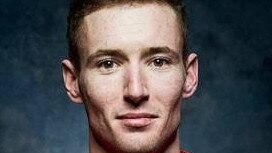
Plumb’s GP then “took the unusual step” of cancelling his driver’s licence before he continued to drive and was caught behind the wheel with drugs in his system.
His offending “ramped up” this year when he broke into his brother’s house and got caught with methamphetamines.
In February, Plumb broke into a restaurant, destroying a door, damaging a ceiling and “ransacking” the place. He was found incoherent and in possession of cannabis.
On another day he was found “agitated” in someone’s house with a large kitchen knife and a stolen laptop after destroying a glass window and letterbox.
The most serious of his offences occurred on March 10 when he burgled a house, stealing 50 items worth in excess of $4000, including jewellery, mobile phones, car keys and clothes.
Plumb attempted to sell two watches at a loan office.
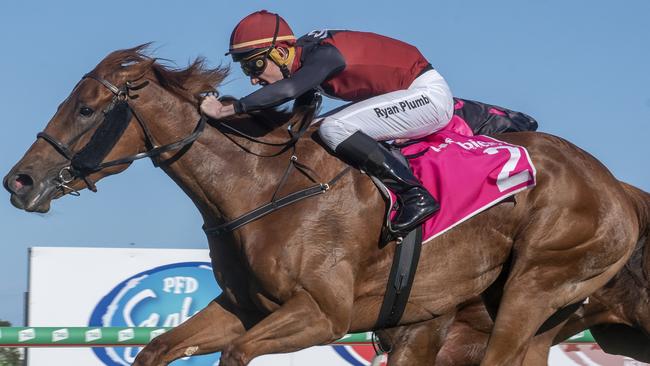
“The facts speak of someone who has descended into drug use over a long period,” Magistrate Pink said.
“It was a sufficiently long period as to alienate family … and also sufficient enough period of time as to result in (Plumb’s driver’s) licence being cancelled by a GP and being suspended from work.
“That is the worrying aspect, that this happened over time.”
Magistrate Pink said it was enough to justify imprisonment but she took into account the “exemplary life” defence solicitor Demi Quadrio, from Gatenby Criminal Lawyers, said Plumb exhibited before 2021.
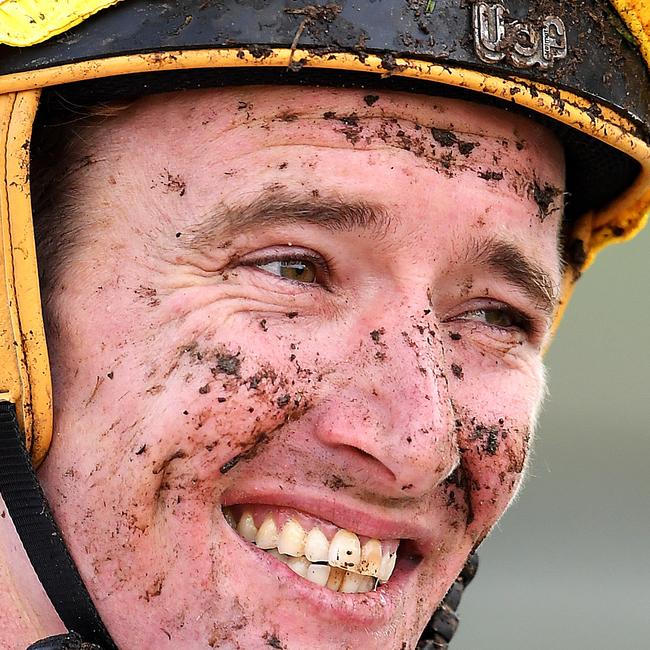
It included his ability to leave school at 14 to complete a jockey’s apprenticeship by 19 before riding in 5000-6000 races in a successful career that included stints in Singapore, New Zealand, China and domestically in Queensland, Adelaide and Melbourne.
Ms Quadrio said the use of drugs among jockeys was “rife”, but was instructed by her client that illicit substances hadn’t been an issue in his life before 2021.
She said drug use became a regular occurrence for Plumb in May last year and it spiralled out of control following his separation from his partner before he lost his job and his two children went to live with his parents.





